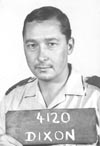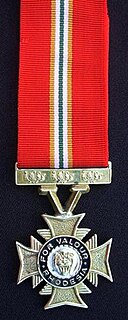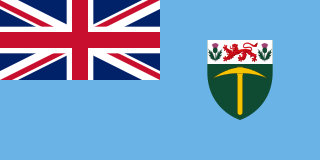
Rhodesia, officially from 1970 the Republic of Rhodesia, was an unrecognised state in Southern Africa from 1965 to 1979, equivalent in territory to modern Zimbabwe. Rhodesia was the de facto successor state to the British colony of Southern Rhodesia, which had been self-governing since achieving responsible government in 1923. A landlocked nation, Rhodesia was bordered by South Africa to the south, Bechuanaland to the southwest, Zambia to the northwest, and Mozambique to the east. From 1965 to 1979, Rhodesia was one of two independent states on the African continent governed by a white minority of European descent and culture, the other being South Africa.

Ian Douglas Smith was a Rhodesian politician, farmer, and fighter pilot who served as Prime Minister of Rhodesia from 1964 to 1979. He was the country's first premier not born abroad, and led the predominantly white government that unilaterally declared independence from the United Kingdom in November 1965 following prolonged dispute over the terms, particularly British demands for black majority rule. He remained Prime Minister for almost all of the 14 years of international isolation that followed, and oversaw Rhodesia's security forces during most of the Bush War, which pitted the unrecognised administration against communist-backed black nationalist guerrilla groups. Smith, who has been described as personifying white Rhodesia, remains a highly controversial figure.

Southern Rhodesia was a landlocked self-governing British Crown colony in southern Africa, established in 1923 and consisting of British South Africa Company (BSAC) territories lying south of the Zambezi River. The region was informally known as south Zambesia until annexed by Britain at the behest of Cecil Rhodes's British South Africa Company, for whom the colony was named. The bounding territories were Bechuanaland (Botswana), Northern Rhodesia (Zambia), Moçambique (Mozambique), and the Transvaal Republic.

The Unilateral Declaration of Independence (UDI) was a statement adopted by the Cabinet of Rhodesia on 11 November 1965, announcing that Southern Rhodesia or simply Rhodesia, a British territory in southern Africa that had governed itself since 1923, now regarded itself as an independent sovereign state. The culmination of a protracted dispute between the British and Rhodesian governments regarding the terms under which the latter could become fully independent, it was the first unilateral break from the United Kingdom by one of its colonies since the United States Declaration of Independence in 1776. The UK, the Commonwealth and the United Nations all deemed Rhodesia's UDI illegal, and economic sanctions, the first in the UN's history, were imposed on the breakaway colony. Amid near-complete international isolation, Rhodesia continued as an unrecognised state with the assistance of South Africa and Portugal.

Chief Jeremiah Sikireta Chirau, ICD was a notable figure among Rhodesia's chiefs, and during the UDI he became the only leader of the Zimbabwe United People's Organisation (ZUPO), a party largely comprising chiefs.

Squadron Leader Christopher John Taylor Dixon D.C.D., also known by his callsign of Green Leader, was a Rhodesian military pilot for the Rhodesian Air Force and was born in Shabani, Southern Rhodesia. He was best known for leading the Rhodesian Operation Gatling bombing raid over Zambia, which later became known as the "Green Leader Raid".

The Internal Settlement was an agreement which was signed on 3 March 1978 between Prime Minister of Rhodesia Ian Smith and the moderate African nationalist leaders comprising Bishop Abel Muzorewa, Ndabaningi Sithole and Senator Chief Jeremiah Chirau. After almost 15 years of the Rhodesian Bush War, and under pressure from the sanctions placed on Rhodesia by the international community, and political pressure from South Africa, the United Kingdom, and the United States, the Rhodesian government met with some of the internally based moderate African nationalist leaders in order to reach an agreement on the political future for the country.
The Rhodesian honours system was established at the time that Rhodesia unilaterally declared itself a republic in March 1970, when a system of military and civil decorations and awards was instituted by Presidential Warrant in November 1970.
The Legion of Merit was a Rhodesian order of merit awarded to both civilian and military recipients for service to Rhodesia.

The Silver Cross of Rhodesia was Rhodesia's second-highest military decoration for conspicuous gallantry.

The Bronze Cross of Rhodesia was a Rhodesian military decoration for gallantry.

The Zimbabwean Independence Medal, 1980 was instituted on 17 April 1980 for award to those who were involved in the Zimbabwean independence process or commemorations in some way.

The Grand Cross of Valour was Rhodesia's highest military decoration, awarded for conspicuous valour by members of the Security Forces in combat.

The Rhodesia General Service Medal was the most widely awarded military medal of Rhodesia. It was awarded to members of the security forces and British South Africa Police for service on operations undertaken for the purpose of combatting terrorists or enemy incursions into Rhodesia.
The Independence Decoration was a Rhodesian civil decoration awarded to persons who played a notable and significant part in the Unilateral Declaration of Independence in 1965.
The Police Decoration for Gallantry was a Rhodesian gallantry award. A handful were awarded for conspicuous gallantry to members of the British South Africa Police, Police Support Unit and Police Reserve.
The Defence Cross for Distinguished Service was a Rhodesian military decoration awarded for distinguished service to Rhodesia's armed forces.

The history of Rhodesia from 1965 to 1979 covers Rhodesia's time as a state unrecognised by the international community following the predominantly white minority government's Unilateral Declaration of Independence on 11 November 1965. Headed by Prime Minister Ian Smith, the Rhodesian Front remained in government until 1 June 1979, when the country was reconstituted as Zimbabwe Rhodesia.
The Meritorious Conduct Medal was a Rhodesian military decoration for brave and gallant conduct.
John McVicar Malloch ICD, was a South African-born Rhodesian bush pilot, gun-runner and sanctions-buster who flew in World War II and in various legal and illegal roles around Africa and the Middle East until the early 1980s. in 1978, he was the final recipient of the Rhodesian civil Independence Commemorative Decoration for services rendered to the country.











